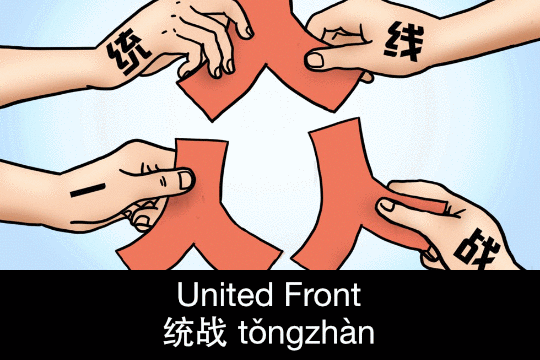Behind the United Front – China’s latest top news
Jeremy Goldkorn’s selection of the top stories from China on October 26, 2017. Part of the daily The China Project newsletter, a convenient package of China’s business, political, and cultural news delivered to your inbox for free. Subscribe here.

Behind the United Front
At the 1922 4th World Congress of the Communist International in Moscow, the “united front” tactic was announced as “an initiative whereby the Communists propose to join with all workers belonging to other parties and groups and all unaligned workers in a common struggle to defend the immediate, basic interests of the working class against the bourgeoisie.”
The Communist Party of China has different aims today, but as the Financial Times reports (paywall), the United Front Work Department (中共中央统一战线工作部) is still a “movement directed from the pinnacle of Chinese power to charm, co-opt or attack well-defined groups and individuals.” Moreover, the report says that President Xi Jinping “is quietly ramping up” the operations of the United Front.
- The FT obtained a teaching manual for United Front cadres, which “exhorts cadres to be gracious and inclusive as they try to ‘unite all forces that can be united’ around the world,” but also “to be ruthless by building an ‘iron Great Wall’ against ‘enemy forces abroad’ who are intent on splitting China’s territory or hobbling its development.”
- The United Front has nine bureaus, dedicated to co-opting the following groups and regions:
– China’s eight non-communist political parties
– Minorities and religious groups
– Hong Kong, Macau, Taiwan, and overseas Chinese
– Cadres (the FT says “little is known” about this bureau’s work, but it seems to focus on “cultivating cadres and operatives”)
– Economics — dedicated to poverty alleviation and cultivating “loyalty among people and areas that have been left behind by the country’s economic advance”
– Non-Party members, non-Party intellectuals — influencers
– Tibet
– New social classes — entrepreneurs and the middle classes
– Xinjiang - For more on the United Front, see “The United Front in an age of shared destiny” (2014) and “The expansion of the United Front under Xi Jinping” (2015), by scholar Gerry Groot.
- Related on The China Project: “New Zealand investigates politician who previously taught Chinese spies” and “China employs ‘magic weapons’ in foreign influence campaigns.”
Susan E. Rice on U.S.-China relations
Susan E. Rice, former national security adviser and U.S. ambassador to the UN, was interviewed for the annual “town hall” event organized by the National Committee on U.S.-China Relations. The interview was streamed live to 86 locations in the U.S. and Asia, where the main act was preceded by local curtain-raiser speeches.
Rice talks about presidential visits, dealing with her Chinese counterparts, and the differences between U.S.-China meetings during the Obama presidency and the way things are run now. You can watch a video of her interview on YouTube. I did the local talk at Harvard’s Fairbank Center for Chinese Studies on Sino-U.S. business, the good, the bad, and the ugly, and you can watch it on Facebook.
Airbnb China
The Information reports (paywall) that the vice president of Airbnb’s China division resigned earlier this week after the company “found that his relationship with a female Airbnb employee violated the company’s code of ethics and hurt the office culture in Beijing.”






